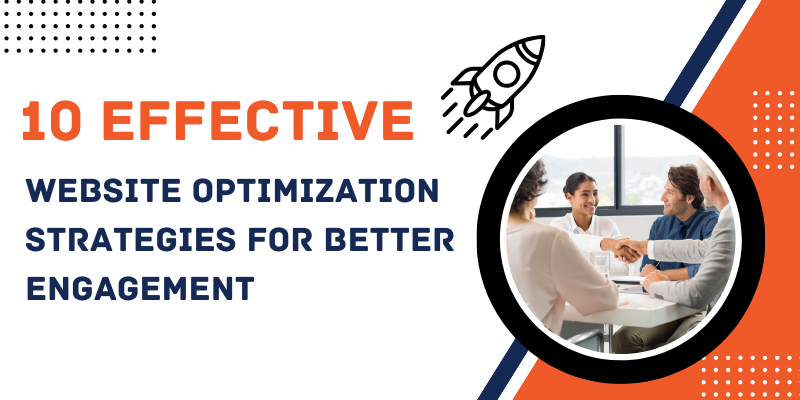


01
Jan
In today’s digital era a well optimized website is essential for better user engagement. By optimizing your website, it gets easy for your targeted audience to locate you. With the related content and strategies, search engines will send more visitors who need your services or products. With the help of quality content and right information on your website, visitors will find and understand the solutions to their needs and will establish your brand as an authority. Their this kind of easy interaction with your website increases a chance of converting the potential visitors into permanent clients.
Here are 10 effective website optimization strategies for better user engagement.
Technical SEO: Technical SEO is required to build a solid website structure. It ensures that your website meets all the technical aspects of search engines. After establishing a Website you simply cannot add pages and posts; as it will be of no use. Whereas an SEO friendly website will help you reach your targeted audience and help your visitors to guide throughout the site and also will get easy for Google to crawl and index your website. The technical aspects of search engines include few crucial steps such as implementing structured data, XML sitemaps and HTTPS.
To begin, you should examine the following and address any problems that are discovered:
Search Intent: As machine learning, artificial intelligence, and deep learning advance, each will gain traction in the Google Core Algorithm. Google's ultimate objective is to comprehend the context of a search query and offer results that are consistent with the user's intent. This makes comprehensive keyword research and keyword selection more critical than ever.
Before putting your time and money to ranking for a keyword, you should look for the websites that are presently at the top of the SERPs. A keyword's contextual relevance must match a search query. There will be some keywords and queries that are difficult to rank for.
Mobile-First: In today’s digital world and increasing use of mobile in our daily life, adopting for a mobile-first approach is important. Mobile optimization includes easy and rapid loading, easy navigation and easily readable content. Here are some basic things you can do to make your site work on phones:
User Experience: Providing a satisfying experience for users is essential if you want to retain them on your website. Make it a priority to develop a design that is user-friendly and intuitive. This contains features such as easy navigation, quick page load times, visually appealing information, and material that is easily accessible. You should do user testing and collect feedback in order to continuously enhance the user experience (UX) of your website. This will ensure that visitors have a pleasant and trouble-free experience.
Schema: The addition of schema markup to a website result in the creation of a rich snippet, which is an expanded description that subsequently appears in the search results.
There is support for the use of microdata across all of the most prominent search engines, including Google, Yahoo, Bing, and Yandex. The true usefulness of schema lies in the fact that it may enhance the manner in which a website is searched and offer context for information.
There is no evidence to suggest that it has any effect on search engine results pages (SERPs).
Keyword Research: Researching keywords is essential to successful search engine optimization and content marketing. It is important to determine the keywords and phrases that your target audience employs while searching for your goods or services. Consider incorporating these keywords into your content, meta tags, and URLs in a smart manner. When you do high-quality keyword research, you guarantee that your material is relevant and can be readily discovered by target audience as well as search engines.
Content Marketing: One can create and share the valuable content through content marketing in order to engage the target audience. With the high-quality content, you can address the needs and interests of your audience, while establishing your brand. Regularly update your blog, create informative articles, and produce engaging multimedia content to keep your audience coming back for more.
Link Building: Link building is the practice of getting backlinks of a high quality from websites that are considered to be trustworthy. Your website's authority and search engine results will improve as a result of backlinks, which are like recommendations for your website. Emphasis should be placed on acquiring links by means of content outreach, guest blogging, and the cultivation of connections with influential individuals in your field. In order to get the most out of your link-building strategy, prioritize quality above number.
Build Backlinks: When high-quality sites link back to yours, Google sees that as a sign that your site is trustworthy, which increases your website's organic traffic. So, make content that people will want to share and ask other sites to link to it. Still, one good backlink is better than a bunch of bad ones, so get your backlinks from sites you can trust. Also, don't buy backlinks because Google punishes sites that do so because it's against its Webmaster Guidelines. SEO tools like Moz Pro, Ahrefs, and Semrush can be used to check the state of backlinks and control link features.
Speed up your site:
Google states that if your website takes too long to load, 53% of people who visit it on their phones will leave. To get the page to load faster: